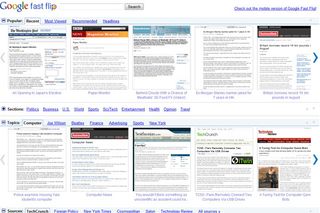Week in Review: Google Flips out
Google shows off its Fast Flip technology, LG goes Android, 802.11n Wi-Fi finally gets official, ARM claims it can take on Intel in netbooks and Microsoft finally admits that Vista wasn’t all that.

It's all change at Intel as one of its long serving employees leaves the company.
Pat Gelsinger was one of the chief architects of the 486 processor, a true powerhouse chip from the late 90s, and he eventually became one of the senior vice presidents. He has moved to storage giant EMC and his departure means the days of the engineers running the show at Intel are coming to a close.
This week, one of the longest running waits in tech history ended as the IEEE finally ratified the 802.11n standard, a process that has taken a mere seven years. Networking companies have been producing socalled draft-n' equipment for donkey's years now, but finally it all gets official.
The standard is apparently based on the draft 2.0 version from January 2007, so one can only speculate on why it has taken more than two-and-a-half years to be ratified.
Google's Android OS continues its march to market share domination as LG joins its list of admirers. The company announced the Android powered GW620, which will bring smartphone power to LG's largely mainstream consumer audience.
One of Android's key challenger's has finally become available for pre-order in the UK this week, as online retailers begin to offer the long-awaited Palm Pre. If you want it SIM free and don't want to get it on contract with O2 when it hits the shelves this Christmas you'll have to shell out the best part of 500, around the same as a 32GB iPhone 3GS.
Google took the wraps of its Fast-Flip' technology that looks to create the feel of flipping pages in an online web world, which it said might help save the world of publishing. It essentially boils down to clicking an arrow rather than a link, so we're not convinced just yet.
Get the ITPro. daily newsletter
Receive our latest news, industry updates, featured resources and more. Sign up today to receive our FREE report on AI cyber crime & security - newly updated for 2024.
This week, it was also revealed that one in eight people in the UK has been hit be online fraud of some kind - that's 12 per cent of the population.
Netbooks have brought the prices of computers down the level that people are picking them up casually in shops but ARM, the chip company thinks its low-cost chip could help bring the cost down as low as $100. It also thinks its new 2GHz chips will help it make a serious play to take on Intel's Atom. It sounds a bit far-fetched to us, but we're happy for them to try.
And finally, we got an explicit admission from Microsoft that Vista, was well, "less good" than it could have been, which is about as honest as it's ever going to be. Thankfully it can admit to this, knowing it's got a strong product on its hands in the form of Windows 7.
And good news for students as they'll be able to get their hands on Microsoft's latest for a mere 30 quid more or less the cost of an evening out these days.
Benny Har-Even is a twenty-year stalwart of technology journalism who is passionate about all areas of the industry, but telecoms and mobile and home entertainment are among his chief interests. He has written for many of the leading tech publications in the UK, such as PC Pro and Wired, and previously held the position of technology editor at ITPro before regularly contributing as a freelancer.
Known affectionately as a ‘geek’ to his friends, his passion has seen him land opportunities to speak about technology on BBC television broadcasts, as well as a number of speaking engagements at industry events.





